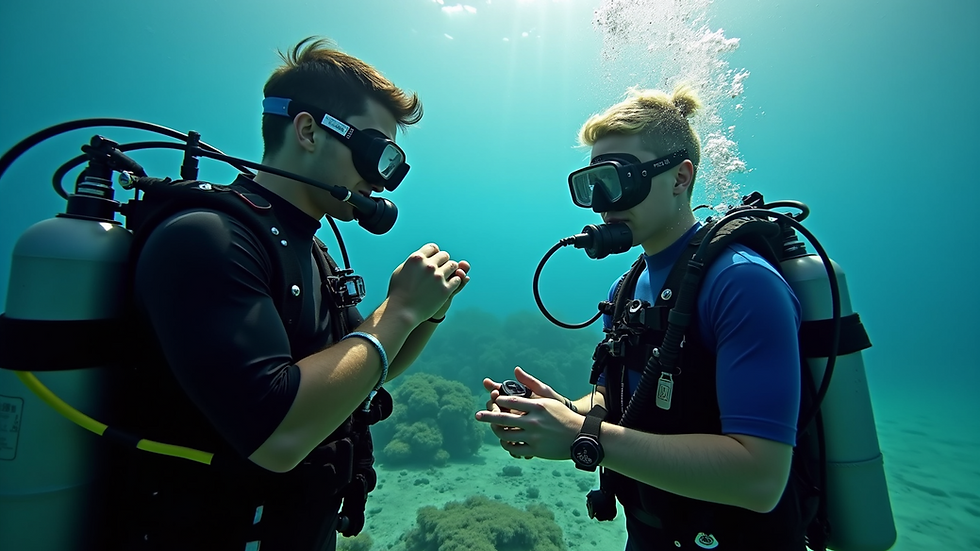Reaching the Pinnacle of Recreational Diving
- Karl

- Aug 19, 2025
- 4 min read
Diving into the underwater world is an exhilarating experience that offers a unique blend of adventure, discovery, and tranquility. Recreational diving opens the door to vibrant coral reefs, mysterious shipwrecks, and diverse marine life. For many divers, the journey does not stop at basic certification. Instead, they aim to reach the highest levels of skill and knowledge, culminating in the prestigious status of a master diver. This post explores how to reach the pinnacle of recreational diving, providing practical advice and insights for divers eager to elevate their underwater experience.
Understanding Recreational Diving and Its Appeal
Recreational diving is a popular activity enjoyed by millions worldwide. It involves diving for pleasure rather than professional or commercial purposes. The appeal lies in the opportunity to explore underwater environments safely and with confidence. Recreational diving courses teach essential skills such as buoyancy control, underwater navigation, and emergency procedures.
One of the key attractions of recreational diving is the accessibility. With proper training, anyone in good health can enjoy the underwater world. The equipment is designed to be user-friendly, and dive sites range from shallow reefs to deep wrecks, catering to all skill levels.
To get started, divers typically complete an open water certification course. This foundational training covers the basics and prepares divers for safe exploration. From there, divers can pursue advanced certifications to enhance their skills and knowledge.

Advancing Your Skills in Recreational Diving
Once you have your basic certification, the next step is to build on your skills through advanced courses and specialty training. These courses focus on specific aspects of diving, such as deep diving, night diving, underwater photography, or wreck exploration. Each specialty adds to your competence and confidence underwater.
Advanced training also improves safety. For example, learning how to manage nitrogen narcosis or how to navigate complex underwater environments reduces risks. Many divers find that these courses deepen their appreciation for the ocean and its ecosystems.
Joining dive clubs or groups can also enhance your recreational diving experience. These communities offer opportunities for group dives, knowledge sharing, and social connections. Experienced divers often mentor newcomers, providing valuable tips and encouragement.

How Long Does It Take to Be a Master Scuba Diver?
Achieving the status of a master diver is a significant milestone in recreational diving. It represents a high level of experience, training, and commitment. But how long does it take to reach this pinnacle?
The timeline varies depending on the diver’s dedication, frequency of dives, and course availability. Generally, becoming a master diver requires completing multiple specialty courses, logging a substantial number of dives, and demonstrating proficiency in various diving skills.
For example, to become a padi master scuba diver, a diver must complete five PADI specialty courses, earn the PADI Rescue Diver certification, and log at least 50 dives. This process can take anywhere from several months to a few years, depending on how often the diver trains and dives.
Consistency is key. Regular diving helps maintain and improve skills, while continuous learning ensures divers stay updated on best practices and safety protocols.

Essential Tips for Reaching the Master Level in Recreational Diving
Reaching the master level requires more than just completing courses. It demands a mindset focused on safety, continuous improvement, and respect for the marine environment. Here are some actionable tips to help you on this journey:
Dive Regularly - Frequent diving helps reinforce skills and build confidence.
Take Specialty Courses - Choose specialties that interest you and broaden your expertise.
Practice Rescue Skills - Rescue training enhances your ability to assist others and handle emergencies.
Maintain Your Equipment - Proper gear maintenance ensures reliability and safety underwater.
Stay Physically Fit - Good health and fitness improve your diving performance and reduce risks.
Keep Learning - Attend workshops, read diving literature, and stay informed about new techniques and equipment.
Respect the Environment - Practice responsible diving to protect marine ecosystems for future generations.
By following these tips, you not only improve your skills but also contribute to a safer and more enjoyable diving community.
Embracing the Journey Beyond Mastery
Achieving the master diver status is a remarkable accomplishment, but it is also a stepping stone to further exploration and growth. Many divers continue their education by pursuing professional certifications such as Divemaster or Instructor. These roles allow divers to share their passion, teach others, and lead dive expeditions.
Moreover, diving offers endless opportunities for adventure. From exploring remote dive sites to participating in marine conservation projects, the journey never truly ends. Each dive brings new experiences and challenges that enrich your connection with the underwater world.
Remember, the pinnacle of recreational diving is not just about certifications or numbers. It is about cultivating a deep appreciation for the ocean, honing your skills, and enjoying every moment beneath the waves.
Reaching the pinnacle of recreational diving is a rewarding pursuit that combines skill, knowledge, and passion. Whether you are just starting or aiming for the master level, the underwater world offers endless possibilities for discovery and adventure. Dive safely, keep learning, and embrace the incredible journey that recreational diving provides.






Comments